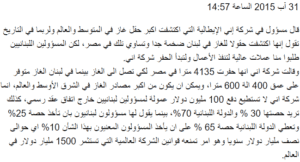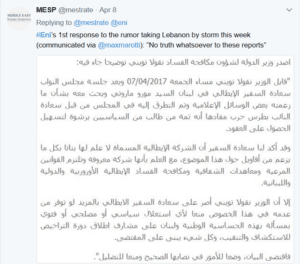The rumor about Lebanese officials supposedly asking Italian company, Eni, for bribes in return for an exploration license is still making the rounds. It fades and resurfaces at random.
The news was first reported in 2015 in a local newspaper whose credibility is widely questioned in Lebanon. It did not catch on at the time since it was assumed it suffered from a bias of sensationalism. According to the brief article, an unnamed official working with Eni admitted Lebanese officials demanded millions of dollars in return for exploration rights.

It came back in full force in April 2017 after it was reported in the evening news of a popular TV channel, creating a mini-storm in the country leading to heated discussions in the Parliament and affecting Lebanese-Italian relations. It prompted Speaker Nabih Berri to formally ask the Italian government for clarifications. Nicolas Tueni, the Minister of State for Combatting Corruption, also asked Italian Ambassador Massimo Marotti for clarifications.
Eni never responded directly to these claims, but after meeting with Ambassador Marotti, Tueni issued a communique saying the Ambassador confirms the Italian company “has no knowledge” of claims they were asked for bribes.

This indirect response was not enough to dispel concerns about possible corrupt practices. Media and politicians continued with the blame game. Although the original article does not mention names, the backlash against current Energy Minister Cesar Abi Khalil (and Foreign Minister Gebran Bassil, himself a former Energy Minister) is such that he has announced that he will be suing anyone implying any involvement in the “Eni case”. Ironically, instead of calming these rumors – which are just rumors until they are backed up – they contribute to perpetuating them by bringing up the issue in each of their media appearances.
It’s an interesting example showcasing the power of disinformation. An issue that first appeared in a newspaper whose credibility is widely questioned, is relayed years later by one media after the other, without any of them providing a shred of evidence to back up their stories, and politicians engaging in blame games. Eni appears to be caught up in gossiping and local politicking. The more the rumor is repeated, the more it becomes accepted, and that is facilitated by the fact that Eni is embroiled in corruption scandals in several countries.
Eni is among the companies that pre-qualified for Lebanon’s first licensing round as operator. It has a solid presence in the Eastern Mediterranean, in Cyprus, Egypt and Libya, allowing it to potentially create synergies. It has regularly expressed interest in Lebanon’s offshore potential in the past, even before the launching of the licensing round in May 2013. And it has the backing of the Italian government. During a visit to Beirut in May 2017, Foreign Minister Angelino Alfano said Italy is hoping Eni will have a role in the exploitation of offshore resources.
In this note, reserved for its clients, MESP examines this case closely and evaluates its impact on ENI’s image in Lebanon and the region.
